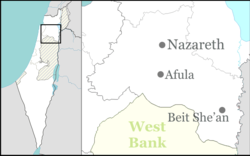Tel Adashim
Tel Adashim
תֵּל עֲדָשִׁים | |
|---|---|
 | |
| Etymology: Lentils Hill | |
| Coordinates: 32°39′19″N 35°18′4″E / 32.65528°N 35.30111°E | |
| Country | Israel |
| District | Northern |
| Council | Jezreel Valley |
| Affiliation | Moshavim Movement |
| Founded | 1923 |
| Founded by | Hashomer Members |
| Population (2022)[1] | 1,523 |
Tel Adashim (Hebrew: תֵּל עֲדָשִׁים, lit. 'Lentils Hill') is a moshav in northern Israel. Located between Nazareth and Afula, it falls under the jurisdiction of Jezreel Valley Regional Council.[2] In 2022 it had a population of 1,523.[1]
History
[edit]Arab and Jewish villages
[edit]Jewish settlement began in the area in 1913 when Hashomer established Tel Adash, a settlement whose purpose was to protect the oil pipeline from Iraq to Haifa. By 1918, only two families remained.[3]
In 1921 Zionist activists completed a purchase of 22,000 dunams at Tell el-Adas from the Sursuk family of Beirut. At that time, there were 150 Muslim families living there.[4]
In the 1922 census of Palestine, conducted by the British Mandate authorities, Tal Adas had a population of 118; 98 Muslims, 16 Jews and 4 Christians.[5]
1923 moshav
[edit]In 1923, a moshav ovdim was established on the site and was named Tel Adashim.[3]
-
Tel Adashim 1924
-
Tel Adashim 1930
-
Tel Adashim from Mizra with Mount Tabor in background 1947
Notable residents
[edit]Notable past and present residents include Rafael Eitan, Yigal Cohen, A. D. Gordon and Alexander Zaïd.[3]
References
[edit]- ^ a b "Regional Statistics". Israel Central Bureau of Statistics. Retrieved 21 March 2024.
- ^ Tel Adashim Moshavim of Israel
- ^ a b c About Tel Adashim (in Hebrew)
- ^ List of villages sold by Sursocks and their partners to the Zionists since British occupation of Palestine, evidence to the Shaw Commission, 1930
- ^ Barron, J. B., ed. (1923). Palestine: Report and General Abstracts of the Census of 1922. Government of Palestine. p. 38.
External links
[edit]- Official website
- Moshav Tel Adashim Collection on the Digital collections of Younes and Soraya Nazarian Library, University of Haifa





